#Good Omens meta
Text
One thing that really gets me about the opening with angel Crowley is that he's not just excited by how beautiful his stars are, or how fun the process of creation is, or how impressed he's made Aziraphale. He’s not in it for the glory or the aesthetics. He’s actually horrified by the idea that the universe will just be "fancy wallpaper" in the future, even though Aziraphale assures him that humans will "marvel" at his creations.
What Crowley loves about his stars is their potential. He is building, essentially, a nursery. Most of the universe's stars, he explains to Aziraphale, will come pre-aged--but his are just starting out! After they're given time to grow, who knows what could happen! Good or bad, black holes or new constellations—there are so many possible futures ahead of them, and Crowley can’t wait to see what happens.
And then Aziraphale tells him that he knows what will happen: those stars will never grow up. They will never shine or burn out or implode or become anything new. They’ll be destroyed before they get the chance.
"You can't kill kids."
“Whose side are you on?” “God’s, of course!” “Same God that wants me to whack the kids?”
"People die." "They do, don't they?"
“Great pustulant mangled bollocks to the Great blasted Plan!”
"Don't test them to destruction."
"It's always too late."
"Nothing lasts forever." "No, I don't suppose it does."
This fear has been chasing Crowley since before the beginning. It’s what caused his first doubts, put the first traces of gray in his wings. He’s been raging at the futility of watching beautiful, complex things be damned or destroyed for his entire existence, and that’s why he seems to the audience and to Aziraphale to be a mess of contradictions.
He loves to follow the trends of the times, but he clings to his classic car in an era of planned obsolescence for vehicles. He lives in an ultra-modern flat, but finds his greatest comfort in the unchanging security of aziraphale’s old shop. He hates the idea of killing children, but is willing to see a child die if it preserves the rest of the universe and foils the Great Plan. He “goes too fast,” but his most unique and notable power is that he’s learned to stop time.
Crowley hates predestination. He hates divine intervention and the removal of agency. Crowley, the architect of free will, is constantly torn between his love of change and choice and potential and his terror that everything will be destroyed by an unstoppable, incomprehensible higher power. That’s his driving conflict in the way that Aziraphale’s is learning to find his own path without following Heaven’s rules, and I am fascinated to see how it resolves.
#good omens#crowley#good omens meta#good omens 2#long post#angel crowley#do you ever think about Anthony j Crowley and just lose your entire mind?
539 notes
·
View notes
Text
I bought Aziraphale's Bible so you don't have to.
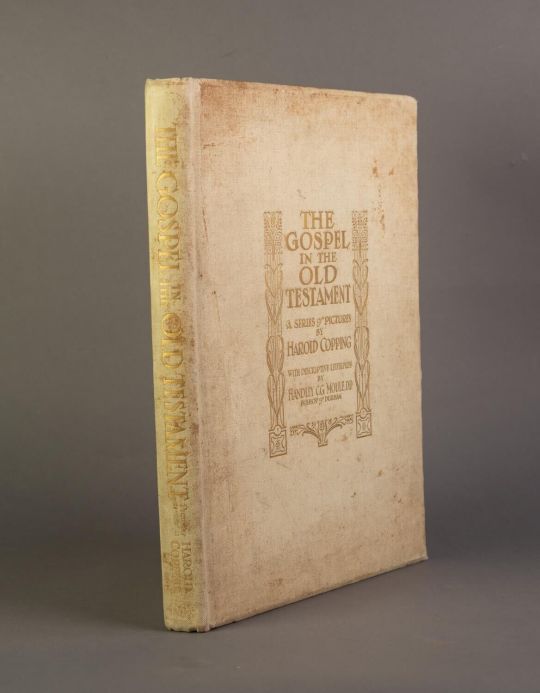

Am I insane? Yes. Was it worth it? Maybe.
In most* of both season 1 and season 2 of GO, there's a very specific Bible on a bookstand next to Aziraphale's desk. It's a vintage illustrated plate book by Harold Copping, known as the Harold Copping Bible, published by the religious tract society in London in 1910. It features some of the most well known Old Testament stories, summarized and annotated by the Bishop of Durham at the time, and illustrated by Copping, who was freshly returned from a sojourn in the middle east. Ironically, It was meant as a lay-person's version of a comic book, short, exciting by use of exotic illustrations, and easy to read.
But my (expensive) gain is now your gain! As I've collected here every visible page in both seasons for your reading and viewing pleasure.
Season 1: All episodes
Adam & Eve
Genesis iii (1:3) / HCB page 10

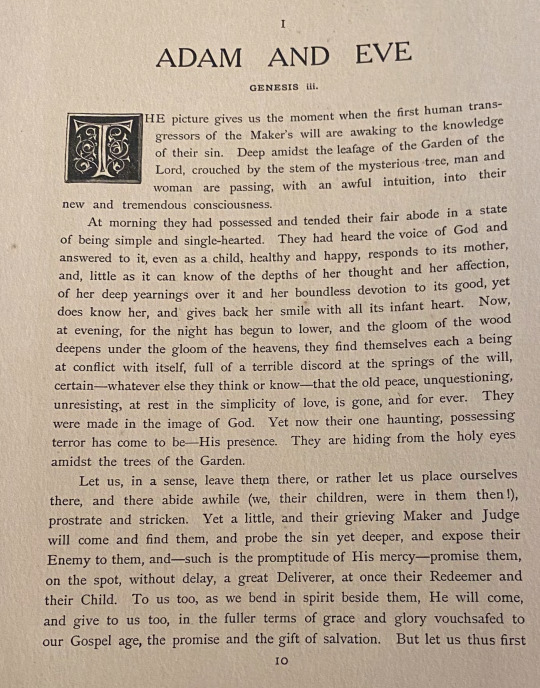
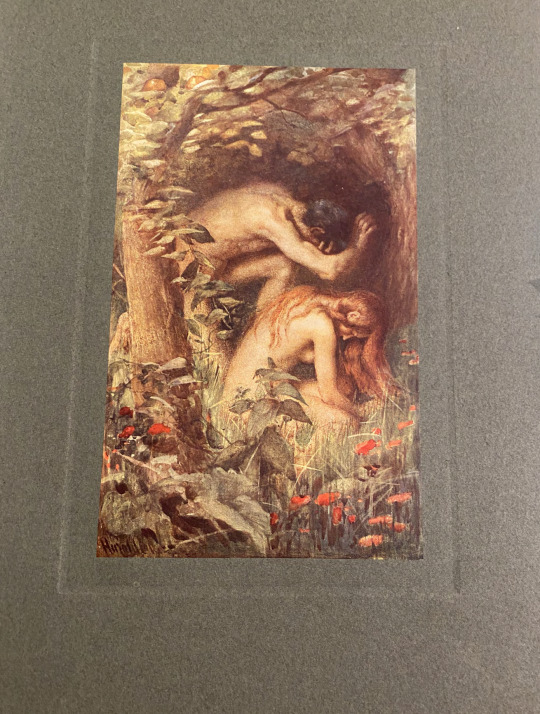
Season 2: Episode 1
Joseph known to his brethren
Genesis xlv (1:45) / HCB Page 28
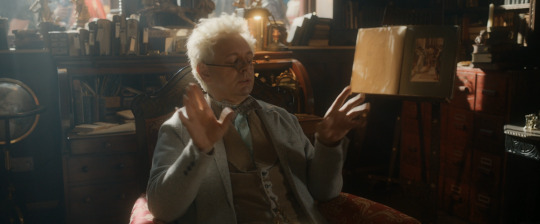
S2E1 14:21, S2E1 17:41, S2E1 39:45
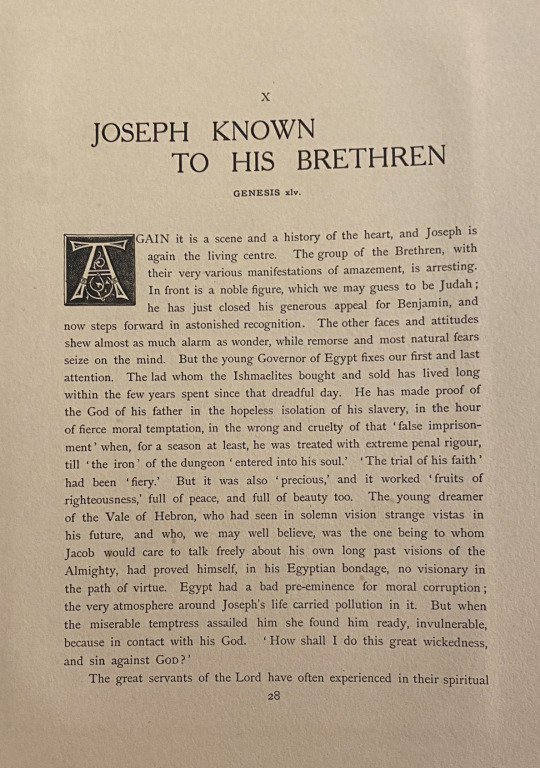
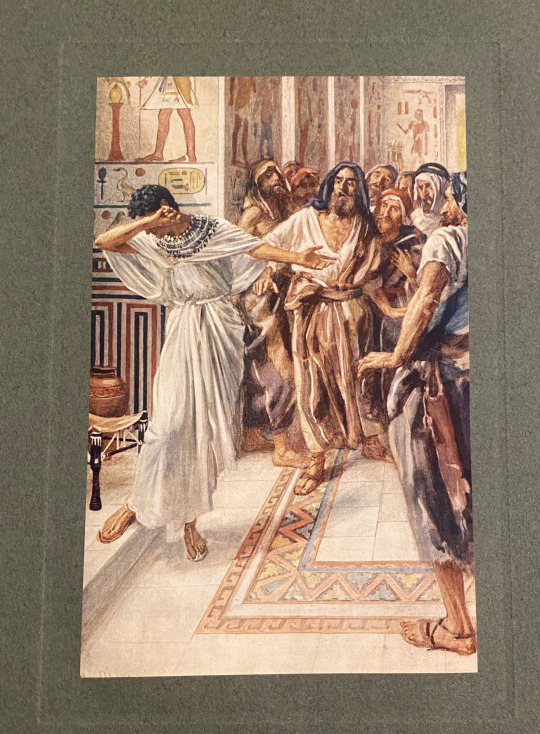
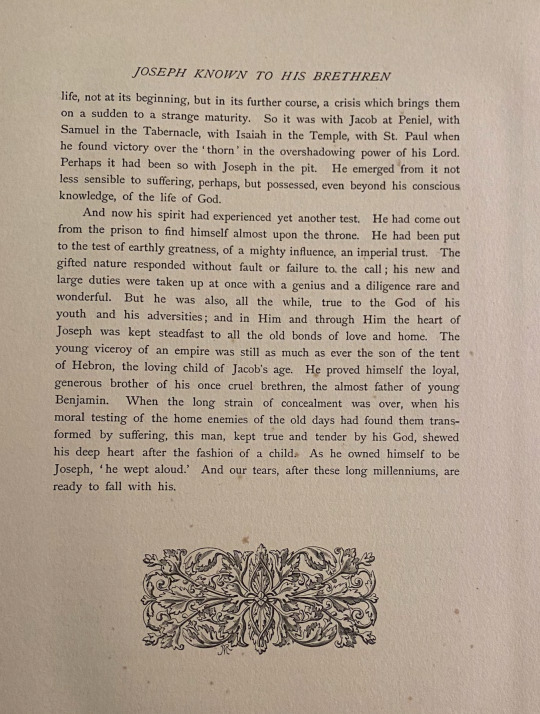
Season 2: Episode 2
Jacob's vow
Genesis xxviii (1:28) / HCB Page 22
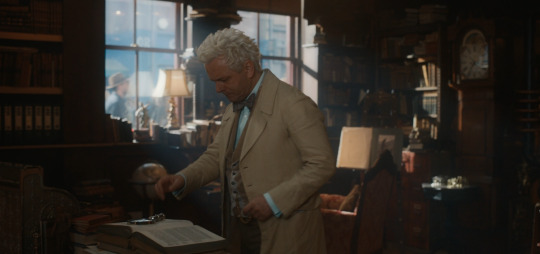
S2E2 5:49
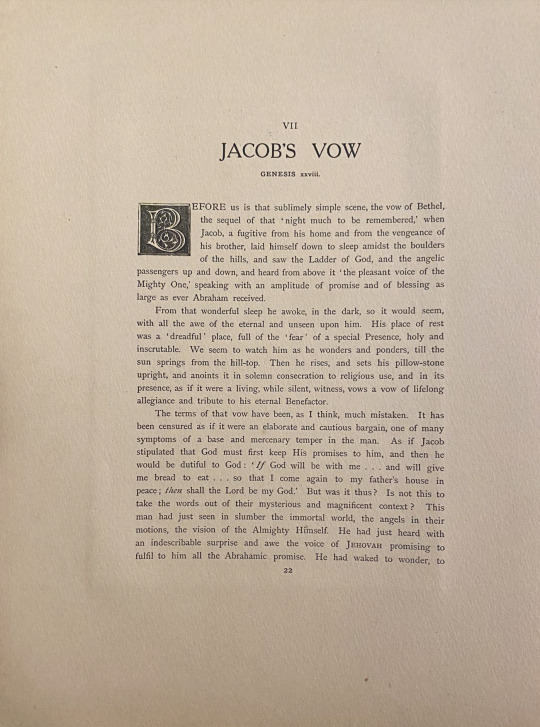
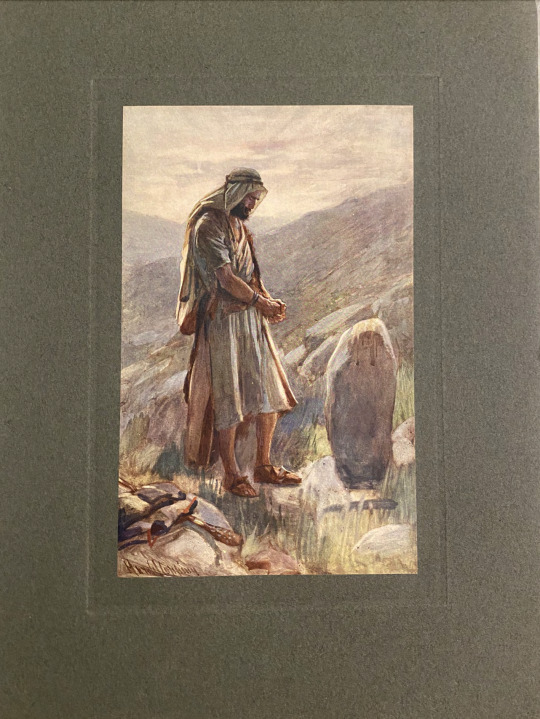
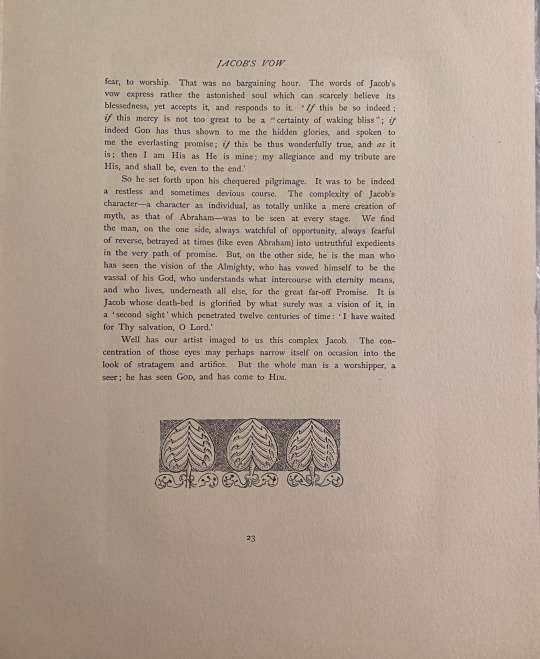
Season 2: Episode 2
Joseph known to his brethren
Genesis xlv (1:45) / HCB Page 28

S2E2 13:38 (see S2E1 above)
Season 2: Episode 2
The Brazen Serpent
Numbers xxi (4:21) / HCB page 36
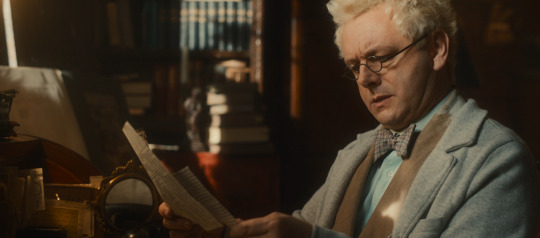
S2E2 16:12, 43:40
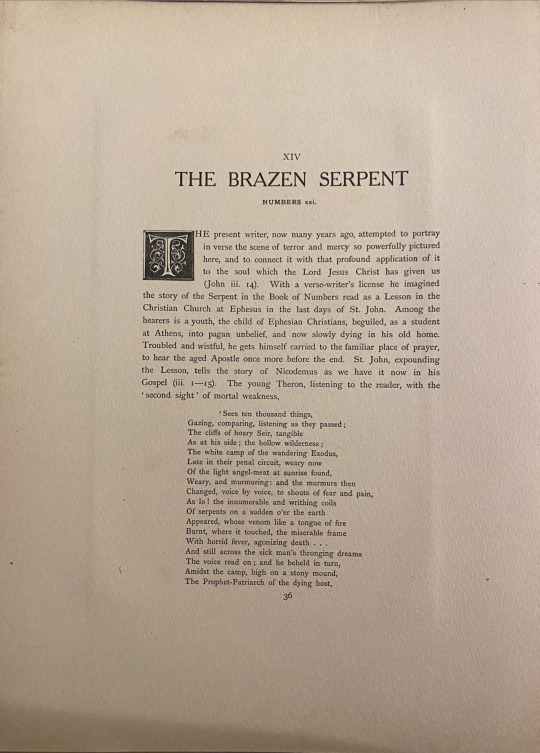
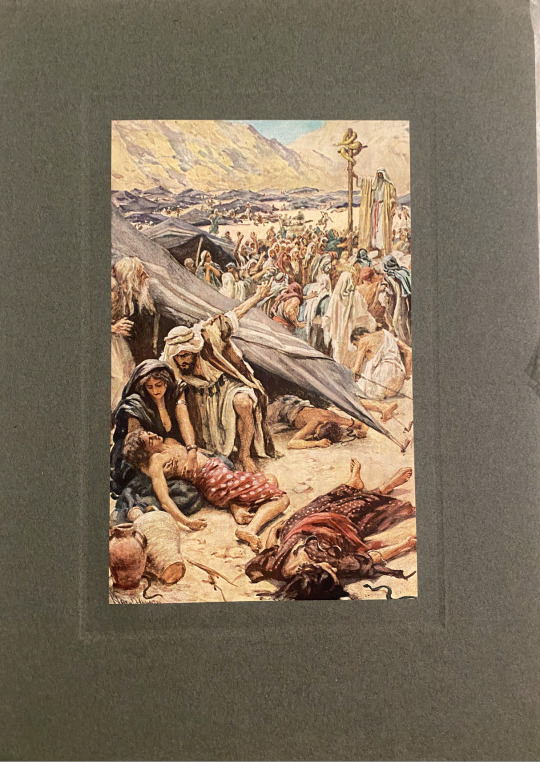

Season 2: Episode 2*
Bible on the desk, Magazine on the stand
Annuel L'art Pour Tous, Cover (1861-1880 most likely)
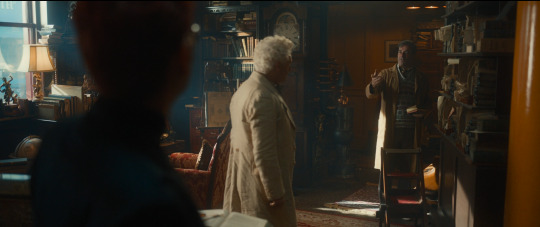
S2E2 22:10

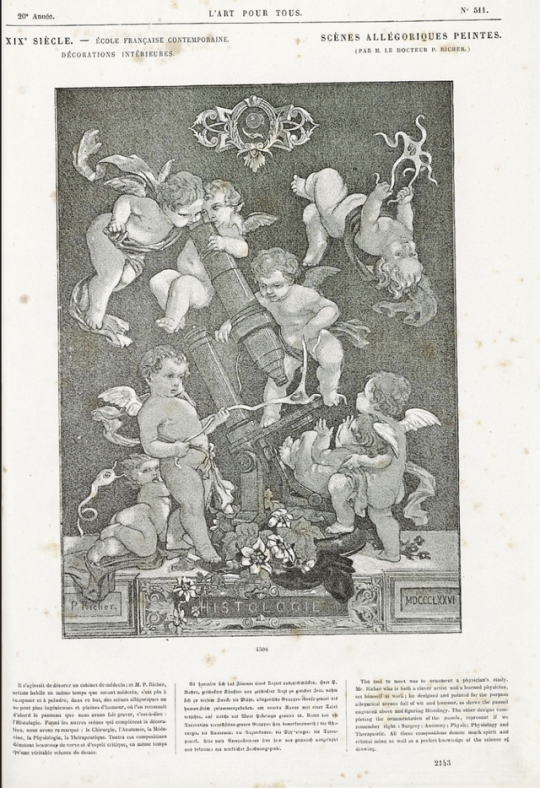
The French L'art pour tous industrial design periodical will have to be a story for another post. For now, just enjoy this 1880 edition copperplate of cherubs discovering a microscope...
Season 2: Episode 2
Imaginary page from HCB, Job
KJV Job (18:1) / HCB N/A
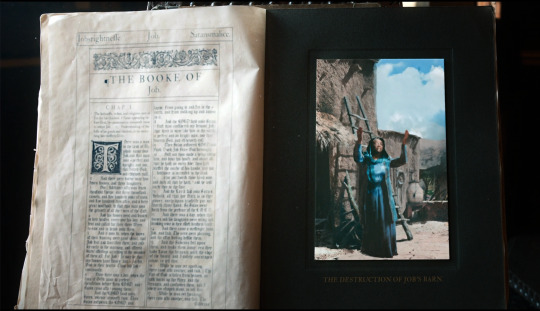
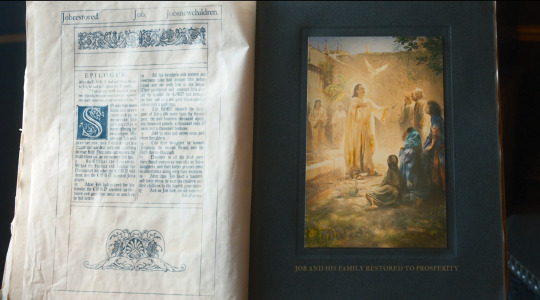
S2E2 22:29, S2E2 40:05
Obviously, the plate illustrations and text look different here than in the real bible, because they were created for the show. But there are a few more particularities here. For one, this layout with the thin grid around the text, as well as the paragraph symbol next to the first title, indicate that this would have been a printer's proof copy, not a finished book. It shows you the layout grid and can be annotated for changes. Second, there seems to be a war going on between fonts. Where the "chapter" of Job begins, we get a font and a style similar to the original bible, which gets rudely interrupted by a dropped capital (from the real book) and a Gothic-style font/verse numbers like in the original King James version of the printed Bible.
Season 2: Episode 3
The Brazen Serpent
NUMBERS xxi (4:21) / HCB page 36
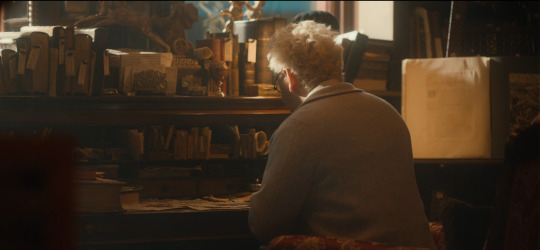
S2E3 1:18 (see episode 2)
Season 2: Episode 5
By the Rivers of Babylon
Pslam cxxxvii (19:137) / HCB page 52
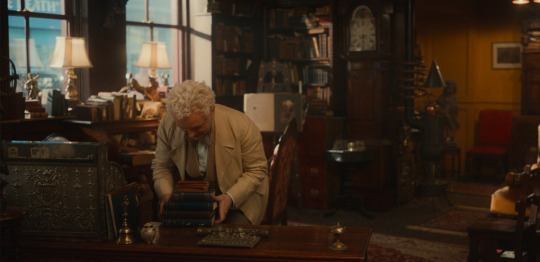
S2E5 21:20
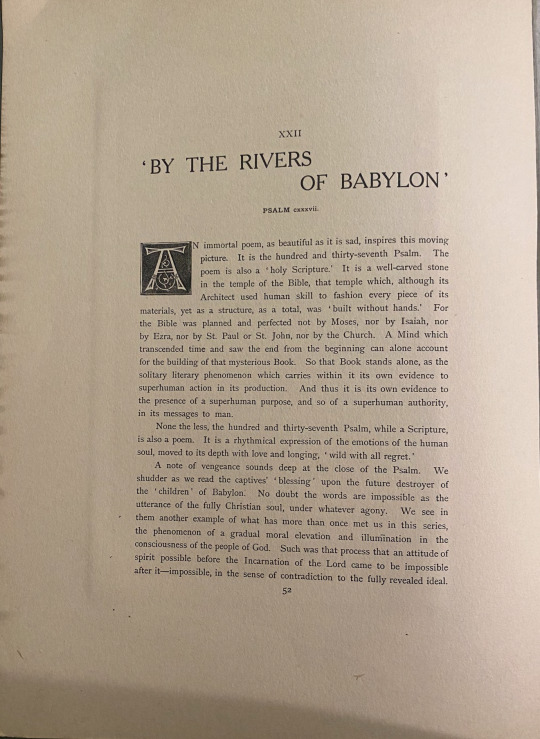
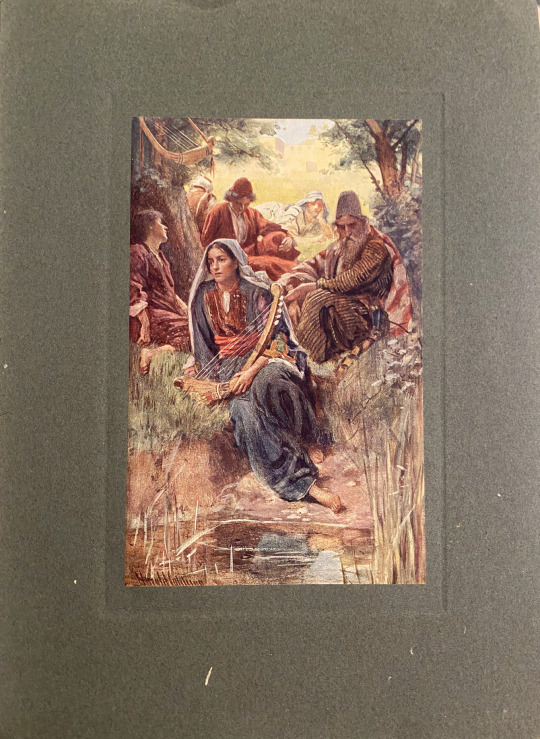
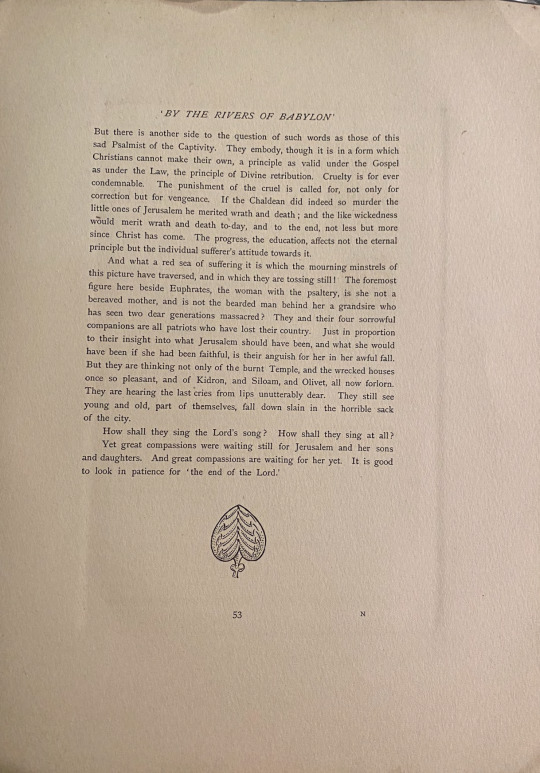
Season 2: Episode 6
Bible missing, L'art pour Tous on the stand
Annuel L'art Pour Tous, Cover (1861-1880 most likely)
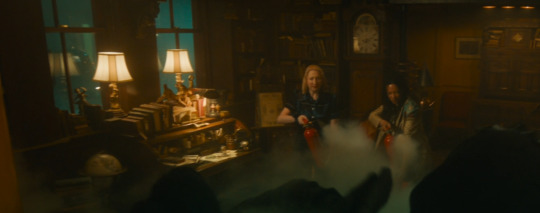
S2E6 10:21, 17:21, 18:15, 34:28 (see episode 2)
Season 2: Episode 6
Closed HCB, L'art pour Tous on the stand behind
HCB page 0
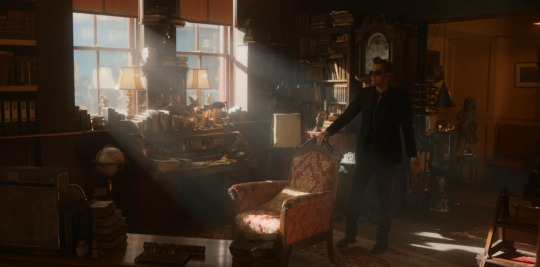
S2E6 37:58, 44:20, 48:08
#good omens 2#art director talks good omens#good omens meta#go season 2#go meta#good omens season 2#good omens season two#good omens#go2#good omens prime#aziraphale#crowley and aziraphale
195 notes
·
View notes
Text
Maggie’s pendants and good omens
Yes, you’ve read it right. This post is going to deal with some literal good omens, not just title drop! But first things first, let’s take a closer look at the topic of this analysis.


A toucan
The top necklace is a lovely design involving a crowned toucan — believed to be a messenger of gods able to travel between the spiritual and the physical world, often associated with rain and rainbow (a Christian symbol of divine love, grace, and mercy, a reminder of the covenant between God and humanity to spare the latter from future trials like the Flood) — encircled by a gold band (a symbol of infinity, eternal love and promise) spun by a small butterfly (a symbol of transformation, hope, and rebirth). All three symbols combined seem to deliver a divine message of hope for rebirth, possibly resurrection, and the eternal life. Very fitting in the context of the Second Coming.
The fact that toucans were revered by the native South Americans as rainbringers strengthens the symbolic meaning of another type of bird we can spot on Maggie’s clothes in the very first episode, as her character introduction — a swallow. Swallows flying low are also believed to be harbingers of rain and bad weather. If you see one close to Earth or a building, it means that there’s a storm — or a certain biblical tempest — on the horizon.
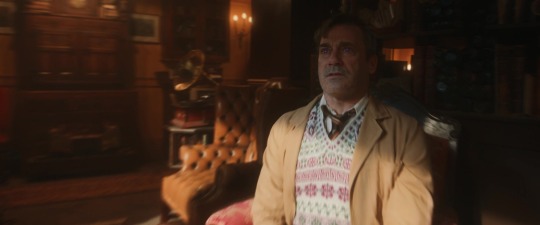
In Ancient Greece and Rome swallows were representing Aphrodite, goddess of love. In Christianity they were considered to be of God and symbolized hope, awakening, and revival of life as messengers of spring and protectors from winter colds. Also helped Jesus on the Cross — according to a Christian legend, a group of swallows was supposed to take out the thorns from the Crown of Thorns and alleviate His Passion on the Cross. Humans banding together in the name of good have been a big theme in the series ever since The Them made an appearance, and from what we already know about the unpublished Good Omens sequel, we can assume that Jesus is going to take the spotlight in the upcoming season.
Maggie definitely attracts sudden inexplicable weather changes, like a thunderstorm with weirdly localized lightning strikes or a sudden downpour. And we’re still waiting for some vavooming (and the following happy ending) to happen in S3.

A heart with an eye
Now, the more nuanced clue hidden in the bottom necklace. I know that some of us were trying to tackle the concept of Maggie’s eye in a heart pendant suggesting her Masonic connotations, but this symbol (or the Eye of Providence in general) isn’t strictly Masonic, it isn’t even limited only to Judeo-Christian art. And while it is used a lot in Christian iconography, we should focus on a very specific example of it already referenced in the show.
Buckle up, we’re making a parachute dive into S1.
It seems like our old friend, Agnes Nutter, still has our backs.

Prophecy 4020:
Let the wheel of fate turne, let harts enjoin, there are othere fyres than mine; when the whirl wynd whirls, reach oute one to another.
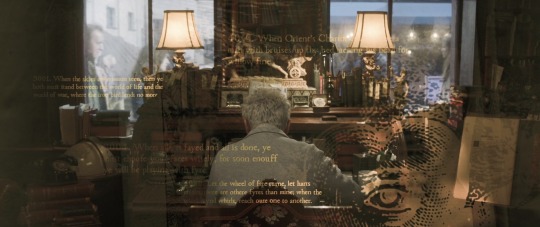
If you look closely at the bottom right corner of this frame, you will see that as an illustration for the above prophecy the production team chose a 1611 engraving titled The Minde should have a fixed Eye On Objects, that are plac’d on High first found in Gabriel Rollenhagen’s Nucleus emblematum selectissimorum.
In 1635 it was published in A Collection of Emblemes, Ancient and Moderne Quickened With Metrical Illustrations, both Morall and Divine, Etc by George Wither with the accompanying hymn:

A Heart, which bore the figure of an Eye
Wide open to the Sunne; by some, was us'd,
When in an Emblem, they would signifie
A Minde, which on Celestiall Matters mus'd:
Implying, by the same, that there is nought
Which in this lower Orbe, our Eyes can see,
So fit an Object for a manly thought,
As those things, which in Heav'n above us be.
God, gave Mankinde (above all other Creatures)
A lovely Forme, and upward-looking Eye,
(Among the rest of his peculiar Features)
That he might lift his Countenance on high:
And (having view'd the Beauty, which appeares
Within the outward Sights circumference)
That he might elevate above the Sphæres,
The piercing Eye, of his Intelligence.
Then, higher, and still higher strive to raise
His Contemplations Eyes, till they ascend
To gaine a glimpse of those eternall Rayes,
To which all undepraved Spirits tend.
For, 'tis the proper nature of the Minde
(Till fleshly Thoughts corrupt it) to despise
Those Lusts whereto the Body stands inclin'd;
And labour alwayes, upward to arise.
Some, therefore, thought those Goblins which appeare
To haunt old Graves and Tombes, are Soules of such,
Who to these loathsome places doomed were,
Because, they doted on the Flesh too much.
But, sure we are, well-minded Men shall goe
To live above, when others bide below.
And hey, guess what 4020, i.e., the number of the prophecy, symbolizes in Strong’s Concordance? Periergazomai, a Greek word meaning “to waste one's labor about something” — to meddle, going beyond proper boundaries (where a person doesn't belong); to fixate on what others are doing, instead of doing what the person himself is supposed to do.
It appears only once in the Bible:
2 Thessalonians 3:11: We hear that some among you are idle and disruptive. They are not busy; they are busybodies. Such people we command and urge in the Lord Jesus Christ to settle down and earn the food they eat. And as for you, brothers and sisters, never tire of doing what is good.
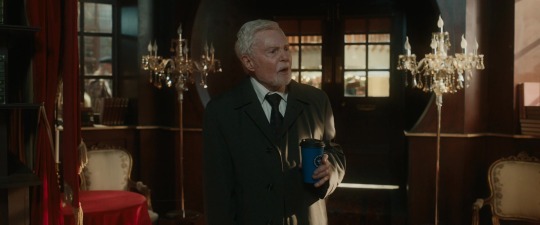
To make things slightly more interesting, in the Hebrew version of Strong’s Concordance 4020 has another meaning — migbaloth, meaning “twisted things, i.e. cords”. Which doesn’t make much sense until we read the actual passage:
Exodus 28:24 and two chains of pure gold, twisted like cords; and you shall attach the corded chains to the settings.
And compare it to the most recent post on the topic published directly by Word of God:

What if all these clues didn’t apply to Maggie and Nina, but Aziraphale and Crowley instead? What if Maggie served as a messenger — consciously or not — just like the toucan, delivering the prophecy to those who need it most?
“When the tempest comes and darkness and great storms, and the dead will leave their graves and walk the Earth once more and there will be great lamentations for the end is near, don’t lose hope, hold hands and look up.”
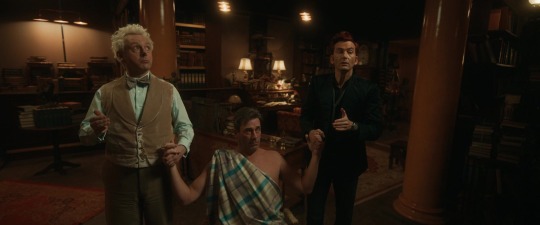
Basically what Aziraphale and Crowley already did when they performed the 25 Lazarii miracle, only with no interference from Gabriel this time around.
And, if both Strong’s Concordance and Maggie’s personal addition to her second pendant are to be believed, with a wedding band somehow involved in the process.
#everything has a meaning#the invisible and unbreakable line that joins Crowley and Aziraphale#two chains of pure gold twisted like cords#never tire of doing what is good#don’t lose hope#hold hands and look up#the good omens crew is unhinged#good omens props#good omens costumes#the nice and accurate prophecies of agnes nutter#agnes nutter#good omens#maggie service#good omens meta#good omens analysis#strong’s concordance#yuri is doing her thing#ineffable husbands#wedding bands
76 notes
·
View notes
Text
Some Random Thoughts on the Nature of Free Will
Thinking about that conversation from the book that got put into The Resurrectionists. Aziraphale is explaining how he and Crowley are good and wicked, respectively, but they have no choice while Elspeth does. Bc humans can't be truly good unless they have the choice to be wicked.
(This is where I usually end up arguing with someone on Twitter lol bc they think Aziraphale is being Mean to Crowley by calling him wicked. It's just a brand name darling, not a judgment call. He literally said in the same breath that he's not TRULY wicked bc he wasn't given a choice.)
So I'm sitting here thinking about free will and the choices the celestials are given, which are not many. And I wonder if one of the reasons they were drawn to the Arrangement was to give them each the choices that humans were born with. One can't be truly good without the opportunity to do wrong, so perhaps being able to work both sides of the equation helped them develop into truly moral beings and not just extensions of their offices. We see in Uz how they're able to work together and bounce off each other to save Job's family, even though the Arrangement didn't properly exist yet.
I've also seen lots of takes and metas that indicate that people view Heaven and Hell as a class system: Heaven is the upper-class privileged majority, while Hell is oppressed, kicked out, downtrodden. I think people forget that the primary difference between the two is aesthetic. Hell has all the same powers as Heaven, and they both intend to burn humanity to the ground in order to prove their gang is best.
No, if we're going to talk about who's got privilege, it's definitely humanity over heaven or hell. We have free will and imagination, which are more miraculous than anything. Sure they've got all these powers and can work miracles and so on, but where's that gotten them? We can actually change things. All they can do is try and influence us to change things, and their success rate isn't high. Two of the most powerful beings in the universe couldn't convince an eleven year old boy to blow things up. That's. Pathetic, actually.
Which brings me back around to the ineffables. Because they actually DO have free will, but I don't think they're used to realizing that they do, which might be why they act a little bone headed sometimes. The show implies and the book comes right out and says that they picked it up from being around humans. And like I said earlier, I think the Arrangement played a big part. They were actually able to choose to do good or evil, a luxury that normally only humans can enjoy.
And the best part of this, for me anyway, is knowing that everything that they are to each other is a conscious choice. Aziraphale didn't want to be a fighter, so he gave his sword away and made the conscious choice to be soft and silly and get into scrapes. And Crowley chooses to come to his rescue because he likes it, not because he is obligated. It's a way for him to choose to do good without getting in trouble. They are each other's outlet to explore humanity in a way that would be impossible if they were on their own.
Aziraphale speaks French badly and flutters his eyelashes and plans elaborate Balls because he loves doing human things and he wants to do them with Crowley. Crowley drives a sleek classic sex machine with bullet hole stickers on the windows and goes on capers and performs daring moves because he loves doing things the human way and he wants to do them with Aziraphale. The way they interact and work together because they WANT to, and not because it's their Great Bloody Destiny or whatever, is so fucking beautiful to me.
#aziraphale#good omens#crowley#ineffable husbands#aziracrow#aziraphale my beloved#good omens meta#crowley good omens#free will#heaven and hell
75 notes
·
View notes
Text
So, there are only three of the original six verses in Tori Amos's version of A Nightingale Sang in Berkley Square, right? I was writing a scene from episode five, season 2, so for continuity's sake, I checked the approximate place the song starts up in the Bentley when Crowley starts the car in episode 6.
The song begins to play at around 1:09, just before the interlude and right before the last line verse two:
I may be right, I may be wrong
But I'm perfectly willing to swear
That when you turned and smiled at me
A nightingale sang in Berkeley Square
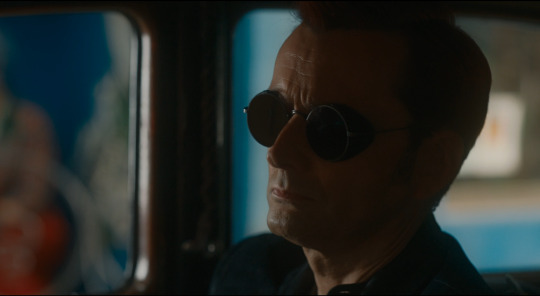
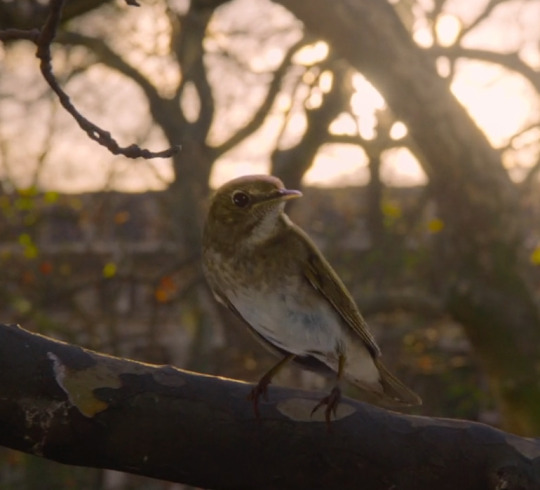
Out of curiosity, I went back to season one, and though it plays on through the credits, the actual footage cuts off right at the tail end of verse one:
That certain night, the night we met
There was magic abroad in the air
There were angels dining at the Ritz
And a nightingale sang in Berkeley Square
Let's imagine for half a second that since Neil and Tori Amos are friends and her version was recorded specifically for the series, each verse refers to a related event, i.e. Crowley and Aziraphale's season one end Ritz date.
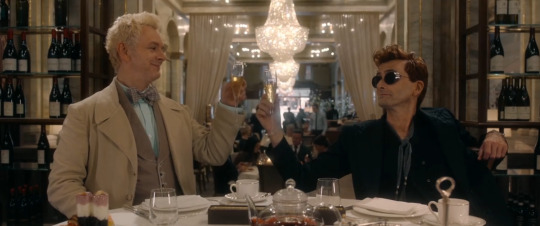
And that though things go entirely south during the following fifteen minutes, verse two perhaps refers to these moments preceding it:

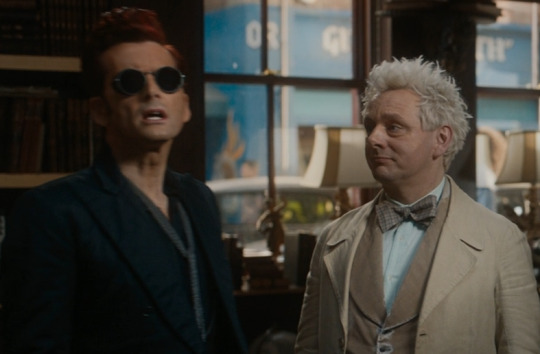
Then it's not out of the realm of possibility that the closing scene of season three could end with verse three:
The streets of town were paved with stars
It was such a romantic affair
And as we kissed and said goodnight
A nightingale sang in Berkeley Square
If the established pattern of relating a preceding event continues, then maybe, just maybe, Crowley and Aziraphale will share a kiss- a good, sweet, happy kiss- just before the series ends for good.
#I'm probably out of my mind but#thank you for coming to my ted talk#please don't tag Neil#good omens#crowley#aziraphale#ineffable husbands#aziracrow#ineffable partners#a/c#good omens 2#aziraphale x crowley#ineffable divorce#the final fifteen#a nightingale sang in berkeley square#good omens meta
105 notes
·
View notes
Text
God, they really do love a shoulder angel-demon framing moment.

And I'm starting to HATE that bust. Far too ominous.
This one's for you @melbatron5000
#good omens#good omens 2#good omens meta#aziraphale#crowley#crowley x aziraphale#good omens theories#good omens clues
60 notes
·
View notes
Text
Are there Two Gabriels?
PSA: Do NOT send anything to NG about any of this or any theory please! I don't want these things to be DOA.
Not literal two versions of the same guy, but is there another meaning of the word Gabriel that we're conflating with, er, Gabriel?
For example, what if Gabriel is a title (like supreme archangel?), or a type of angel, or a legend, or a record, or a type of miracle? When things involve Gabriel or Gabriel is missing or we're all looking for Gabriel, is it really, truly, Jim? Or are they looking for something else?
Thoughts I've been chewing on:
When Aziraphale says Jim isn't Gabriel, Jim responds, "Then what am I?" Not who am I
Later when Crowley is grilling him, at one point he says, "if you're not [Gabriel] then what are you?" not who are you
If it is a title, are some of the Crowley (and Shax) scenes later? (i.e. is "his royal smugness" Aziraphale with the title of Gabriel??) (tbf I do think Crowley is in cahoots with Aziraphale at the end and won't actually be going through sad breakup times but that's neither here nor there)
There's also a focus on names that have various/ambiguous meanings: Inspector Constable, Bildad the Shuhite, Mrs. Sandwich, Mr vs Dr Dalrymple, Jane Austen, and of course, Jim.
#good omens spoilers#gos2#good omens#aziraphale#crowley#Jimbriel#gabriel good omens#good omens meta#good omens theory
37 notes
·
View notes
Text
Heartache
Since I put up my theories that Crowley and Aziraphale faked the break up in the Final Fifteen, I've had a LOT of people comment, "Then why are they so sad?"
LISTEN.
Imagine you and the person you love most in the world have to keep your relationship secret. Because no one would approve of it, and one or the other of you could be hurt or killed or imprisoned over it. So you keep it casual, and have to pretend you're not even friends.
Then you get a chance to change everything. You get a chance to save the world, and maybe have that relationship you both want so badly together. You even plan your proposal. You throw a big party and make it as romantic as you know how.
Then your party gets crashed by people who hate you.
And then an authority -- one that has the power to make both your lives horrible and maybe end them -- comes sniffing around. He's figured out you're up to something, and that you've teamed up, and been teamed up for a while. He maybe suspects you're more than friends, when even friends is something you are not allowed to be. He essentially black mails you into coming back with him, to what essentially amounts to prison, though he offers that your love can come with you. You'll both be in prison, and maybe not be able to save the world, but you'll be together, and safe.
You tell the person you love most in the world what's going on, that your plan has been uncovered, and beg him to come with so he will be safe. And your beloved says, "No, I'm not going, I want to fight for this. I want to fight for you, and for us. I want to save the world. We need to pretend to break up so I can keep working on our plan. You do what you can from inside prison, and I'll do my best from here, and let's try for this. For us." And then he breaks your heart and forces you to reject him. While your enemy watches and waits to take you to prison. And he doesn't let you leave without kissing you first. He gives you something while he kisses you that he hopes will help you. And then he goes.
Imagine your beloved tells you an authority has come sniffing around -- he suspects you're up to something and wants to haul you both to prison. Your beloved has no choice, he absolutely is going to prison, right now, but he wants you to come with him. You want to fight, you want to be free with your beloved and you want to save the world. So you tell him you have to fake a break up in order that one of you can stay free and hopefully make it work. And then you break his heart, and force him to reject you, while your enemy watches and waits to take him to prison. And you do not let him leave without kissing him first. You give him something while you kiss him that you hope will help him. And then you leave.
If you could do that while feeling nothing, totally confident that you're still a couple and everything is actually fine, you've got a different head than me. I wouldn't be okay, watching my husband get taken to prison for the crime of being in love with me. I certainly wouldn't be okay pretending not to care, or like we never meant much to each other after all.
The break up is fake. That doesn't mean any of those emotions are.
It actually makes it worse, in my opinion.
If Aziraphale had actually chosen Heaven over Crowley, Aziraphale would be sad, but not miserable. But he hasn't. He's going to prison without the one person he most wants to protect and be with. And he has no guarantee that Crowley will be safe, or that they will ever see each other again. He must be devastated.
If Aziraphale had chosen Heaven over Crowley, Crowley would have every right to be hurt and angry. But Aziraphale hasn't. He's being dragged to prison, where Crowley can't be with him and make sure he's okay, where Crowley knows he'll be treated badly, and Crowley's going to try to save the world, and if he succeeds, they can build that life together they've wanted for so long; but if he fails, they may never see each other again. He must be devastated.
Stop asking why they both look so sad if the break up is fake.
They are devastated.
#good omens#good omens 2#crowley#aziraphale#good omens meta#ineffable husbands#aziracrow#good omens analysis#good omens fan theory#the final fifteen#ineffable divorce#final fifteen#our poor husbands#it's so much more sad than it first seems
53 notes
·
View notes
Note
Please tell me you have an idea when it comes to how "A Nightingale" becomes their song in 1941? Everytime I think about the last part of that, I can't get the song to fit. Any thoughts?
I haven't written it all out in an actual post, but my current theory is that it actually didn't become their song in 1941-- because it already was by then... because Aziraphale wrote it for Crowley in 1939.
He gave it to Eric Maschwitz and Manning Sherwin the way that Crowley gave his love poetry for Aziraphale to Shakespeare. 90 years ago is the 1930s, not the 1940s, and "90 years ago" was brought up a few times in S2. The song was also written and first performed in a French fishing village and is full of references to Ineffable Husbands-y stuff, so... might it be their song because it's literally their song? Hmm...
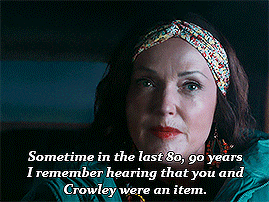
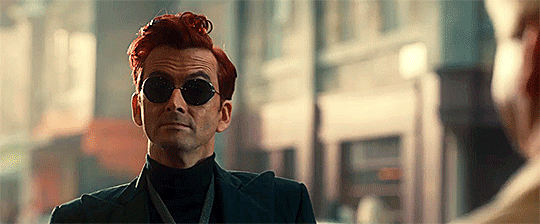
29 notes
·
View notes
Text
Crowley S2 Hair Post #22
(For reference: The Sideburns Scheme)
Crowley, Good Omens 2, Episode 1, The Clue, so were the goats
...
Hairstyle Notes

The red hair is not as fluffy and a little longer compared to the earlier minisode portion that started off the episode.
This style is what most closely resembles a "human" reading with short sideburns from the season 2 present day. Crowley is with two humans and no supernatural beings. The humans assume he is human during the scene.

Even though it's the accessory on the head, even the headband itself changed with its appearance in the back. While that looks to be a continuity issue, it's good to keep in mind that Crowley can control his own appearance so is likely mixing this headband appearance with the reading from the space.
...
Earthly Objects
(For reference: Earthly Objects)
Job sits on the ground against some rocks. Sitis touches her own clothing.
Crowley likely receives credit for a miracle touch on a human when he says, "You tell me," and hisses at Sitis. This action looks like compelling someone for an answer though that answer is something Sitis herself decides. The name, "Bildad the Shuhite" is then said.
That name is his alias for these two. It's a human name from the Book of Job itself, and it's going to be reused later when he has this same hairstyle. While these circumstances are understandable in the context they happen, it's also a clue about the potential rule that Crowley isn't allowed to say his own name for any time period during the entirety of Good Omens 2.
Crowley has several questions when first talking to Job. Job says Sitis' name. They both say "God," in a way that I think qualifies as a name.
It's hard to really see much in the way of pockets. Everyone's separated and contained in their own cuts for most of the scene.
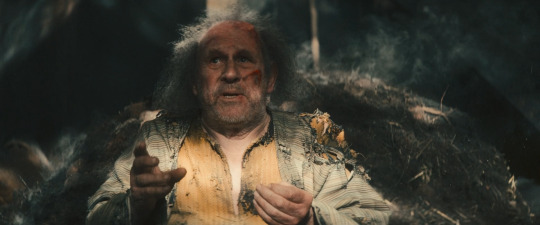


While Job and Sitis occasionally make pockets, those pockets are small and hard to notice to begin with. Their thumb joints do suspiciously align with edges of their clothing at times even though the Tied Hands aren't around.
Crowley's headband is like his substitute Belt Head at least. Sitis also wears something over her head.
Crowley still has the threads on his robe making pockets over his chest for where his Tied Hands would be.
When Crowley turns to show his back to the camera, then shows his front again, he does receive some extra lighting over the part of his chest exposed, before his beard covers it. He receives lighting generally in that area sometimes, and it's where the upper portion of his Tied Hands would be in the present day.
There's one cut with Job on the ground and Crowley standing, so a pocket generally exists between them though it doesn't seem to do anything special. There's another cut with Sitis pocketed between Job still sitting and Crowley still standing. Again, it doesn't seem to do anything special either.
For my tangential reading in my desperate attempt to improve my play, I finished The Sandman Volume 3. I'm still re-reading the Good Omens book.
...
Story Commentary
From the last scene, the story greatly implied that this part of the minisode is from Crowley's point of view. Aziraphale isn't around, and Crowley himself received stronger focus from the camera work.

When Crowley is talking to Job, the lighting on him is darker and favors his left.

When Sitis arrives, the lighting shifts. It then favors Crowley's right. With more light on him, his hair looks more red. After that, the hair generally stays as more red and favoring his right, regardless of the camera angle.


In trying to study the space and understand what's happening with the hair, the camera work ensures it is known that the space still has a roof—or at least roof edges—of a human-built structure, even if it is damaged and with an open threshold. Light pours in, presumably from that damage.
Crowley is not giving off the impression of someone secretly trying to save goats and children here. Without knowing how the minisode ends, the goats seem "destroyed", and now he's after the children.
Things don't look good. Well, things don't look good for people like Job, Sitis, and Aziraphale. Hell would be rather pleased.
Crowley expects Job to be furious with God and says so.
But Job isn't furious with God. He's furious with himself.
Then comes the main hint of Crowley's sympathy from the questions, "Yourself? Why, what have you done?" Then he looked like he wanted to say something more to Job's answer, but they were interrupted with Sitis' arrival.
We'll get a glimpse of Crowley's real scheme for this minisode in the next scene.
...
That's it for this post. Sometimes I edit my posts, FYI.
...
Before the next post in this series, I am going to take some time to review things for The Pocket Trick that I'm hopefully starting to piece together and may update the main Sideburns Scheme post as well.
...
Main post:
The Sideburns Scheme
#crowley#good omens 2#good omens#good omens s2#david tennant#good omens season 2#good omens meta#good omens analysis#good omens crowley#crowley good omens#crowley s2 hair project
21 notes
·
View notes
Text
One of my bitchiest and yet most objectively correct goomens opinions is that basically no one knows how to do the "Crowley calling Aziraphale 'angel'" thing correctly. People manage to both make him do it Way too much while at the same time making it out to be this Immediately 100% Intimate thing. It most certainly carries some of the romantic/homoerotic connotations as it would for human characters, and I think both the text and Crowley in-universe are extremely aware of this, but it also carries something else with it when the person in question literally is an angel. It can be affectionate, but it can also be a neutral statement of fact, or it can even be mocking or disparaging. "Doing good again, angel?" is like the in-universe equivalent of Crowley loudly revving his motorcycle and calling Aziraphale a square
#not that revving your motorcycle and calling someone a square can't be homoerotic in and of itself#but that needs to be like The Dynamic. i like that sort of teasing for them though i think it's cute#open mick night#good omens#gomens#crowley#aziraphale#aziracrow#ineffable spouses#good omens meta#??? sure! sure. who gives a shit anymore i do what i want
22 notes
·
View notes
Text
Why are Shax and War so similar?




That's it. That's the post.
#good omens 2#art director talks good omens#good omens meta#go season 2#go meta#good omens season 2#good omens season two#good omens#go2
77 notes
·
View notes
Text
GO Timeline: In the Beginning
I asked Neil Gaiman, “how it is possible for them to have talked for millions of years” (Crowley, S2, Ep6), and Neil said “because there was lots of angel time before Earth time started.” THUS:
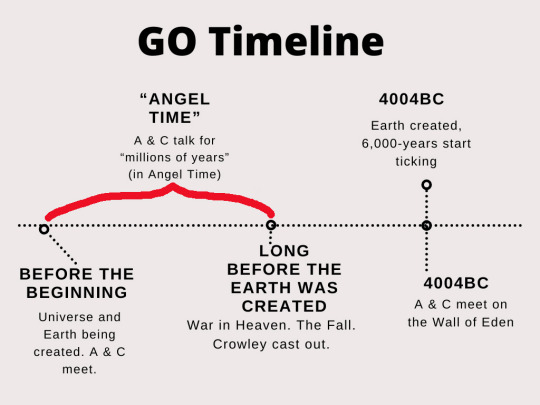
“They’ll be shutting this all down in 6,000 years" either refers only to the Earth (perhaps Azi misunderstood the "word from upstairs", i.e., it didn't refer to the whole universe) OR it's simply "angel time years" which can mean anything.
During that “lots of angel time” (i.e. what Crowley means by “millions of years”), AFTER that first meeting, and BEFORE the Earth’s creation, there is a very, very long time for Aziraphale and Crowley to get to know each other.
This is confirmed by the following ask/reply from August 23, 2023:

NEXT, the Great War/Rebellion happened. In Series 1, Gabriel says, “There was war in Heaven long before the Earth was created. Crowley and the others were cast out.”
How long? Who knows? Then the Earth's creation was finally completed, and its 6,000-year timeline started ticking. And when they meet again on the Wall, Aziraphale has to ask for his friend’s new demon name.
Note: in the bandstand scene, when Crowley says, “How long have we been friends? 6,000 years.” He means, how long have you and I-As-the-Demon-Crowley, not the Angel you knew who I no longer identify with been friends. This is also pointed out in the Job minisode, when Aziraphale firmly states that he knows “the angel you were”, and Crowley firmly denies he’s the same person (“the angel you knew is not me”).
But of course, we all know that some essence of Angel Crowley remains, because of the way he is still “a good person” at heart, right? Right. He can try to deny it, but it’s still there, and Aziraphale knows that. This is why they can stay friends, and why they can love each other.
22 notes
·
View notes
Text
“their miracle was so big bc crowley used to be an archangel” have u considered that aziraphale and crowley love each other so much that their love alone could move the tides just by staring at the ocean for too long. have u considered that they did the miracle not really to protect gabriel but to protect what they had, what they’d built with each other. and that was them barely even trying
#sorry but the whole ‘crowley was an archangel’ take is not the one for this scenario#the whole thesis of the show is that they’re more powerful and at their best when they’re together#their combined miracle is just a manifestation of that#and i can’t wait to see how they use that bit in s3#good omens#good omens meta#go2 spoilers#thoughts
35K notes
·
View notes
Text
Awhile ago @ouidamforeman made this post:
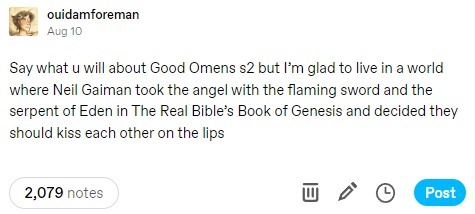
This shot through my brain like a chain of firecrackers, so, without derailing the original post, I have some THOUGHTS to add about why this concept is not only hilarious (because it is), but also...
It. It kind of fucks. Severely.
And in a delightfully Pratchett-y way, I'd dare to suggest.
I'll explain:
As inferred above, both Crowley AND Aziraphale have canonical Biblical counterparts. Not by name, no, but by function.
Crowley, of course, is the serpent of Eden.
(note on the serpent of Eden: In Genesis 3:1-15, at least, the serpent is not identified as anything other than a serpent, albeit one that can talk. Later, it will be variously interpreted as a traitorous agent of Hell, as a demon, as a guise of Satan himself, etc. In Good Omens --as a slinky ginger who walks funny)
Lesser known, at least so far as I can tell, is the flaming sword. It, too, appears in Genesis 3, in the very last line:
"So he drove out the man; and placed at the east of the garden of Eden Cherubims, and a flaming sword which turned every way, to keep the way of the tree of life."
--Genesis 3:24, KJV
Thanks to translation ambiguity, there is some debate concerning the nature of the flaming sword --is it a divine weapon given unto one of the Cherubim (if so, why only one)? Or is it an independent entity, which takes the form of a sword (as other angelic beings take the form of wheels and such)? For our purposes, I don't think the distinction matters. The guard at the gate of Eden, whether an angel wielding the sword or an angel who IS the sword, is Aziraphale.
(note on the flaming sword: in some traditions --Eastern Orthodox, for example-- it is held that upon Christ's death and resurrection, the flaming sword gave up it's post and vanished from Eden for good. By these sensibilities, the removal of the sword signifies the redemption and salvation of man.
...Put a pin in that. We're coming back to it.)
So, we have our pair. The Serpent and the Sword, introduced at the beginning and the end (ha) of the very same chapter of Genesis.
But here's the important bit, the bit that's not immediately obvious, the bit that nonetheless encapsulates one of the central themes, if not THE central theme, of Good Omens:
The Sword was never intended to guard Eden while Adam and Eve were still in it.
Do you understand?
The Sword's function was never to protect them. It doesn't even appear until after they've already fallen. No... it was to usher Adam and Eve from the garden, and then keep them out. It was a threat. It was a punishment.
The flaming sword was given to be used against them.
So. Again. We have our pair. The Serpent and the Sword: the inception and the consequence of original sin, personified. They are the one-two punch that launches mankind from paradise, after Hell lures it to destruction and Heaven condemns it for being destroyed. Which is to say that despite being, supposedly, hereditary enemies on two different sides of a celestial cold war, they are actually unified by one purpose, one pivotal role to play in the Divine Plan: completely fucking humanity over.
That's how it's supposed to go. It is written.
...But, in Good Omens, they're not just the Serpent and the Sword.
They're Crowley and Aziraphale.
(author begins to go insane from emotion under the cut)
In Good Omens, humanity is handed it's salvation (pin!) scarcely half an hour after losing it. Instead of looming over God's empty garden, the sword protects a very sad, very scared and very pregnant girl. And no, not because a blameless martyr suffered and died for the privilege, either.
It was just that she'd had such a bad day. And there were vicious animals out there. And Aziraphale worried she would be cold.
...I need to impress upon you how much this is NOT just a matter of being careless with company property. With this one act of kindness, Aziraphale is undermining the whole entire POINT of the expulsion from Eden. God Herself confronts him about it, and he lies. To God.
And the Serpent--
(Crowley, that is, who wonders what's so bad about knowing the difference between good and evil anyway; who thinks that maybe he did a GOOD thing when he tempted Eve with the apple; who objects that God is over-reacting to a first offense; who knows what it is to fall but not what it is to be comforted after the fact...)
--just goes ahead and falls in love with him about it.
As for Crowley --I barely need to explain him, right? People have been making the 'didn't the serpent actually do us a solid?' argument for centuries. But if I'm going to quote one of them, it may as well be the one Neil Gaiman wrote ficlet about:
"If the account given in Genesis is really true, ought we not, after all, to thank this serpent? He was the first schoolmaster, the first advocate of learning, the first enemy of ignorance, the first to whisper in human ears the sacred word liberty, the creator of ambition, the author of modesty, of inquiry, of doubt, of investigation, of progress and of civilization."
--Robert G. Ingersoll
The first to ask questions.
Even beyond flattering literary interpretation, we know that Crowley is, so often, discreetly running damage control on the machinations of Heaven and Hell. When he can get away with it. Occasionally, when he can't (1827).
And Aziraphale loves him for it, too. Loves him back.
And so this romance plays out over millennia, where they fall in love with each other but also the world, because of each other and because of the world. But it begins in Eden. Where, instead of acting as the first Earthly example of Divine/Diabolical collusion and callousness--
(other examples --the flood; the bet with Satan; the back channels; the exchange of Holy Water and Hellfire; and on and on...)
--they refuse. Without even necessarily knowing they're doing it, they just refuse. Refuse to trivialize human life, and refuse to hate each other.
To write a story about the Serpent and the Sword falling in love is to write a story about transgression.
Not just in the sense that they are a demon and an angel, and it's ~forbidden. That's part of it, yeah, but the greater part of it is that they are THIS demon and angel, in particular. From The Real Bible's Book of Genesis, in the chapter where man falls.
It's the sort of thing you write and laugh. And then you look at it. And you think. And then you frown, and you sit up a little straighter. And you think.
And then you keep writing.
And what emerges hits you like a goddamn truck.
(...A lot of Pratchett reads that way. I believe Gaiman when he says Pratchett would have been happy with the romance, by the way. I really really do).
It's a story about transgression, about love as transgression. They break the rules by loving each other, by loving creation, and by rejecting the hatred and hypocrisy that would have triangulated them as a unified blow against humanity, before humanity had even really got started. And yeah, hell, it's a queer romance too, just to really drive the point home (oh, that!!! THAT!!!)
...I could spend a long time wildly gesturing at this and never be satisfied. Instead of watching me do that (I'll spare you), please look at this gif:
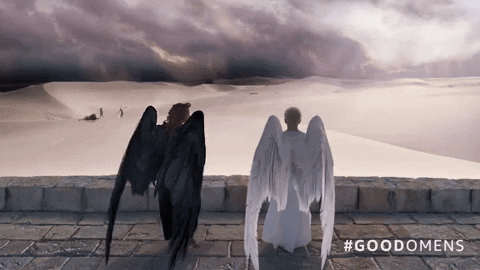
I love this shot so much.
Look at Eve and Crowley moving, at the same time in the same direction, towards their respective wielders of the flaming sword. Adam reaches out and takes her hand; Aziraphale reaches out and covers him with a wing.
You know what a shot like that establishes? Likeness. Commonality. Kinship.
"Our side" was never just Crowley and Aziraphale. Crowley says as much at the end of season 1 ("--all of us against all of them."). From the beginning, "our side" was Crowley, Aziraphale, and every single human being. Lately that's around 8 billion, but once upon a time it was just two other people. Another couple. The primeval mother and father.
But Adam and Eve die, eventually. Humanity grows without them. It's Crowley and Aziraphale who remain, and who protect it. Who...oversee it's upbringing.
Godfathers. Sort of.
#good omens#ineffable husbands#aziracrow#good omens 2#crowley#aziraphale#good omens meta#I have no idea if I've made a coherent point here but I'm tired of this being in my drafts; RAW FEELINGS IT IS#it's about being sent to destroy and instead staying to love and protect and nurture I'M CRAZY I'M CRAZY RAAAAAAAGGHHHH#gnu terry pratchett
26K notes
·
View notes
Text
Red Herrings
Been thinking about the barrel of literal red herrings we're shown in the S2 opening credits...
I need to actually go look but I've been busy lately so I'm copying my thoughts down here for my fellow crack potters before I do. Do we think there's any correlation between the scenes where the barrel is visible in the opening credit processional? And in the show do we think there are cues toward red herrings that we're shown on screen? Some sort of marker?
#good omens#good omens 2#good omens meta#aziraphale#crowley#crowley x aziraphale#good omens theories#good omens clues
59 notes
·
View notes